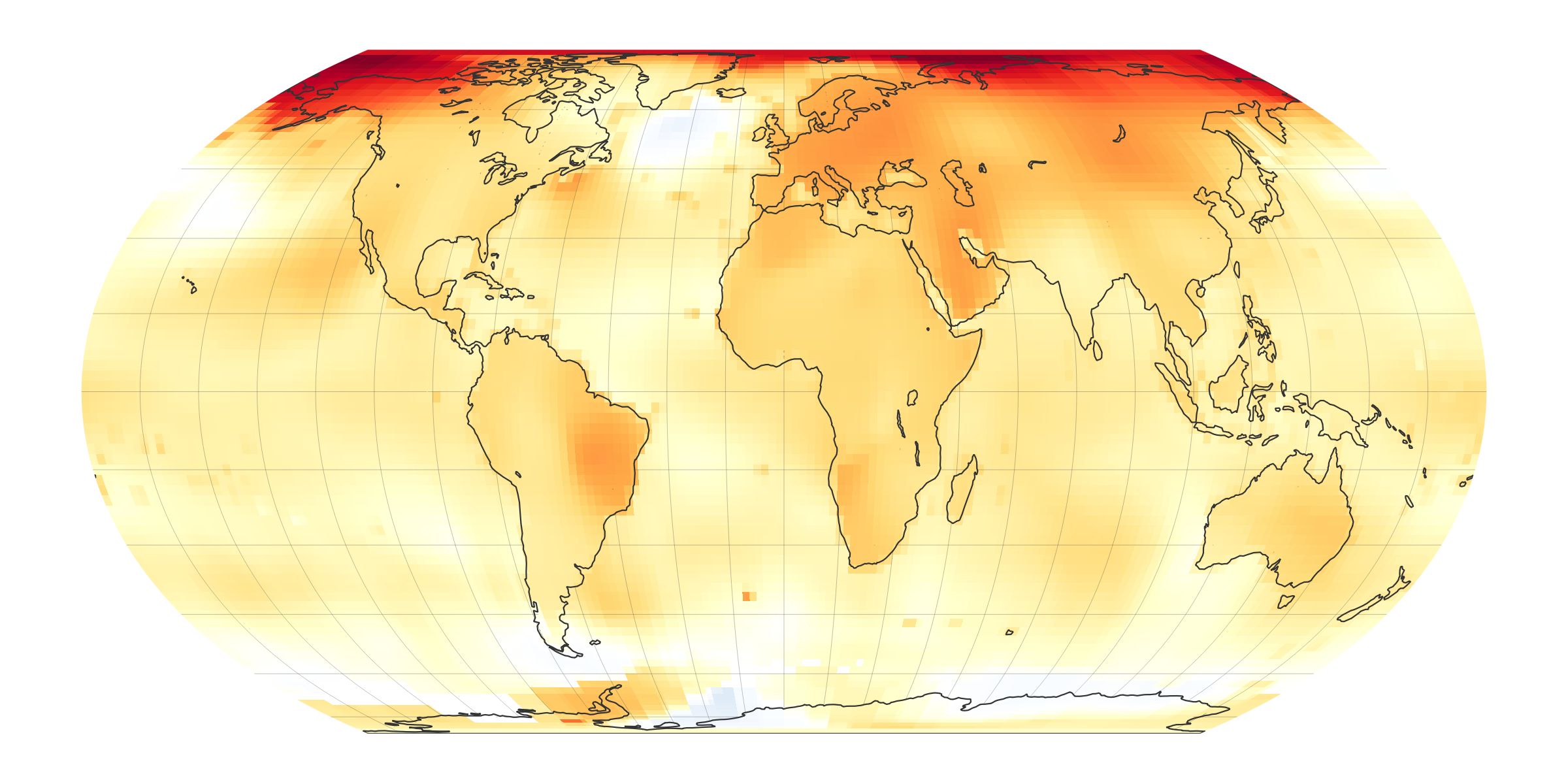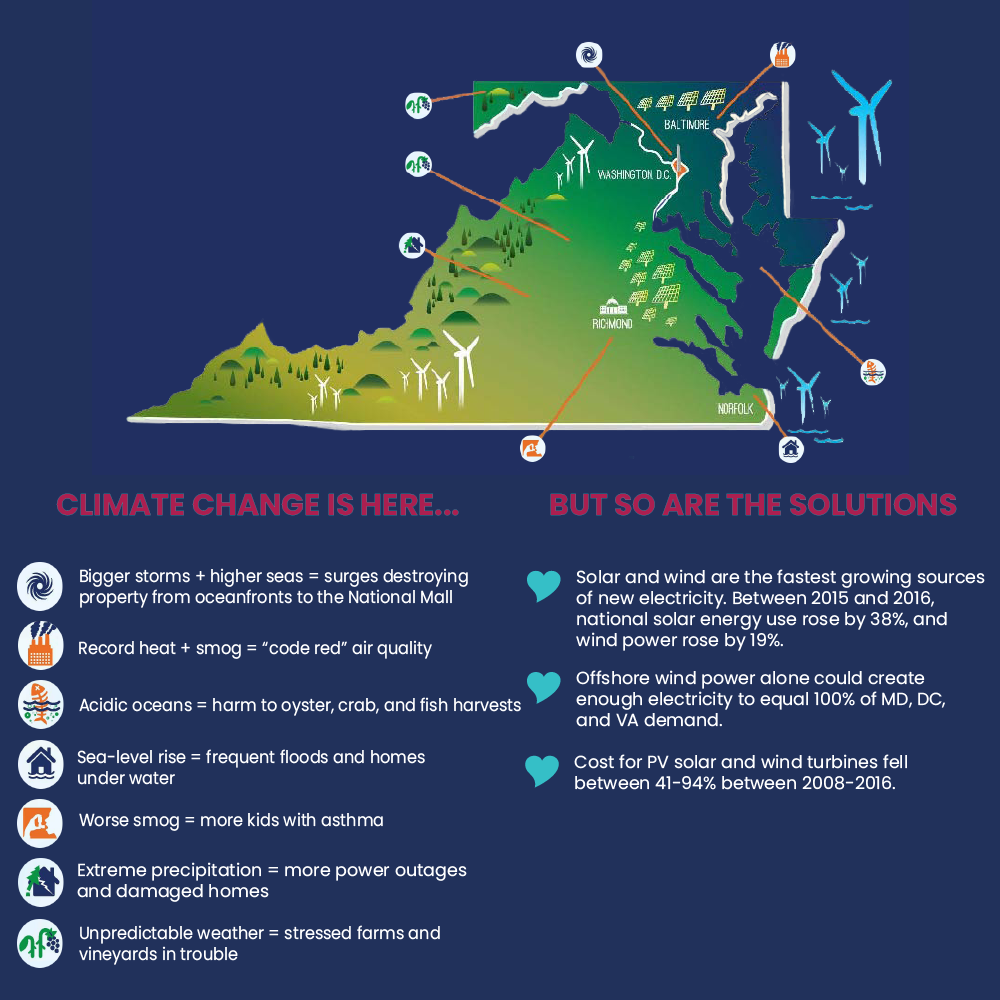
What is “climate change” or “global warming”?
Climate change, or global warming, is generally understood as the gradual increase in the average temperature of earth’s air and oceans. Over the last century, average global temperatures rose by more than 1°F and as much as 4°F in some regions. Ninety-seven percent of scientists conclude that greenhouse gas emissions from human activities are the primary cause of climate change. Fossil fuel burning emits greenhouse gases like carbon dioxide and methane that cause the atmosphere to retain more of the sun’s heat and stay warmer — just like a greenhouse that lets you grow plants in winter by trapping the sun’s heat (Pew Center for Global Climate Change, 2009). These changes in the earth’s temperature are destabilizes ecosystems and planetary processes that humans depend on to survive.

The Science
Ninety-seven percent of the world’s leading atmospheric specialists and climatologists agree that climate change, including global warming and the greenhouse effect, is happening and will have major consequences for human society. The 2018 UN Intergovernmental Panel on Climate Change found that global emissions need to be cut by at least 45% in the next eleven years in order to avoid the most catastrophic impacts of warming — and we need to be carbon neutral by 2050. The people of the Chesapeake Bay region, the United States, and the world need drastic, multilateral action to mitigate and reverse the impacts of climate change that are already here — but governments all over the world have been slow to take up the work.
The Impacts
Climate change is here
- Sea levels have risen eight inches since 1880. And the rate of rise is increasing: three of those inches have occurred since 1993.
- How vulnerable is your home? Check out NOAA’s Sea Level Rise Viewer.
- The 2019 hurricane season was the fourth season with above-average activity in a row, with eighteen named storms, and three violent enough to be called “major.”
- Urban areas are already hotter than rural areas, and this will be exacerbated by climate change. This is particularly bad for children, seniors, and people who work outside like construction workers and some transit employees.
- Globally, the Arctic region could experience a rise in surface temperatures of as much as 45°F by 2100, which would cause almost all Arctic sea ice to disappear (IPCC, 2007).
And it will get worse
Earth is a giant ball of interconnected systems, and the ripple effect from even a small temperature rise impacts everything from drought and summer heat to winter precipitation, water supplies, and species migration. And human health and societal stability would be threatened by any and all of these changes – nor is this a comprehensive list of all the impacts of climate change.
Environmental impacts
- Rising seas and chronic coastal flooding
- Warmer weather, especially in urban areas
- Stronger storms, fed by warmer ocean waters
- Destabilized ocean currents like the Gulf Stream, which will change the climate all over the world
- More common, widespread, and severe droughts
Economic impacts
- A 2006 report by economist and academic Nicholas Stern for the United Kingdom government stated that the cost of global measures to cut greenhouse gas emissions could total 1% of global economic output annually. But the consequences of failing to take preventive measures could even result in a massive world “market failure,” costing from five to more than 20 times that amount (Stern, 2006).
- Economies and industries that depend on the environment, like tourism and fisheries, are threatened
- Climate-related changes and disasters in other countries will impact import/export for US customers and businesses
- Virginia and Maryland are ranked the 4th and 5th most expensive states to build seawalls in — both states will cost tens of billions of dollars. But seawalls will become non-negotiable if we can’t stop ocean levels rising.
Health and Social
- Incidences of insect-borne and waterborne diseases, such as malaria and cholera, would increase due to changes in weather patterns.
- Damage from climate change could end prosperity in developed countries and threaten human survival.
The Solutions
Personal solutions
Ranging from large to small, expensive to free, there are many decisions that you can make to reduce the impact of global warming. Some major ones are:
- Eating locally and in season
- If vegetarianism isn’t accessible for you, eating locally and in-season lowers the distance your food has to travel to get to you, and means less fossil fuels are burned to get you your food. In-season food is also often cheaper.
- Using mass transit and avoiding cars where possible is another way to cut back on your carbon emissions.
- Bikes are a great option, even if you are disabled in some way – check out this article for adaptive cycle types and sources, and look for funding here if needed.
- Home efficiency measures will help lower your energy costs by ensuring you use less power – start with the Department of Energy’s low-income Weatherization Assistance Program
- Limiting plastic consumption and waste
- Composting to keep food waste out of landfills and limit methane emissions: DC residents can take advantage of the city’s home composting rebate program or drop off their food waste at locations throughout DC
Policy solutions
It is essential to incorporate racial justice into all climate work because Black and brown people are more vulnerable to the impacts of climate change. Black and brown people are likelier to be poor and less able to afford safety measures like air conditioning or recovery from devastating storms, and have histories of health conditions that make them more vulnerable to air pollution and extreme heat. Furthermore, environmental racism is extremely common – this looks like siting pollution sources like landfills and compressor stations near majority Black and brown communities, and Native American reservations. Prime examples of this are the laying of the Keystone XL pipeline near the Standing Rock Sioux reservation rather than a white suburb, and the placement of the Gidley Compressor Station in Buckingham, Virginia near the majority-Black neighborhood of Union Hill. Fighting racism is integral to fighting climate change.
The most effective thing one person can do is help pass local, regional, and national policies! CCAN advocates for a swift transition away from fossil fuel-based energy sources to carbon-free, renewable energy sources like wind and solar energy. Along with energy efficiency measures, these energy sources can power the global economy without releasing the carbon emissions that lead to climate change. We support a number of approaches to speed this transition, like Renewable Portfolio Standard policies for renewable electricity requirements; fossil fuel moratoriums; and more. Follow our campaigns in Maryland, Virginia, and Washington, DC.
—
Citations
Center for Climate Integrity. (2019, June). High Tide Tax: The Price to Protect Coastal Communities from Rising Seas. Retrieved July 9, 2020 from https://www.climatecosts2040.org/files/ClimateCosts2040_Report-v5.pdf
Fjord, L. (2018, December). Union Hill Community Household Study Site and Methods Report – A Community Participatory Action Research Project Part II: Households: Demographics, Health, Land Use, Family Heritage. Retrieved on July 10, 2020 from https://www.deq.virginia.gov/Portals/0/DEQ/Air/BuckinghamCompressorStation/PUBLIC_COMMENT_DOC_Fjord_Union_Hill_Community_Household_Study_Site_Demographic_Methods_3.pdf.
Luber, G. and McGeehin, M. (2008, November). Climate Change and Extreme Heat Events. Retrieved July 10, 2020 from https://www.ajpmonline.org/article/S0749-3797(08)00686-7/fulltext
McIntosh, K., et. al. (2020, February). Examining the Black-white wealth gap. Retrieved July 10, 2020 from https://www.brookings.edu/blog/up-front/2020/02/27/examining-the-black-white-wealth-gap/
National Oceanic and Atmospheric Administration. (2019, November). Active 2019 Hurricane Season Comes to an End. Retrieved July 9, 2020 from https://www.noaa.gov/media-release/active-2019-atlantic-hurricane-season-comes-to-end
NASA Earth Observatory. (2020). World of Change: Global Temperatures. Retrieved July 10, 2020 from https://earthobservatory.nasa.gov/world-of-change/decadaltemp.php
Schneider, G. (2018, December). “Big company, big dollars, small community: Dominion deal sparks dissent in community facing gas project.” Retrieved July 10, 2020 from https://www.washingtonpost.com/local/virginia-politics/dominion-deal-sparks-dissent-in-community-facing-pipeline-project/2018/12/09/050e5f52-f99d-11e8-863c-9e2f864d47e7_story.html
Stern, N. (2006). Stern review on the economics of climate change. Retrieved September 29, 2011 from http://webarchive.nationalarchives.gov.uk/+/http://www.hm-treasury.gov.uk/sternreview_index.htm
U.S. Global Change Research Program. (2018, November). Fourth National Climate Assessment. Retrieved July 9, 2020 from https://nca2018.globalchange.gov/.
US Global Change Research Program. (2018). Rate of Global Sea Level Rise is Increasing. Retrieved July 9, 2020 from https://www.globalchange.gov/browse/indicators/global-sea-level-rise


